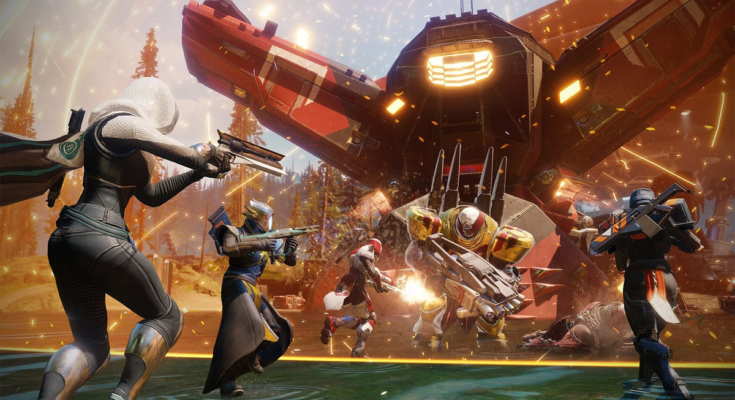
Earlier this month, a bunch of Destiny 2 YouTube videos, including some by high profile content makers and even Bungie themselves, were hit by rogue copyright takedown notices generated by fake Google accounts. Bungie is now trying to sue the people responsible, and has called out YouTube for getting tricked by alleged fraudsters in the first place.
The Destiny copyright takedown spree began earlier this month, hitting soundtrack videos, cutscenes, and eventually other content including videos posted by Bungie itself. Streamers with hundreds of thousands of subscribers like My Name is Byf and AztecRoss were hit as well, leading to a mini-freakout that Bungie had changed its content maker guidelines, which have traditionally been extremely lax.
“These actions are NOT being taken at the request of Bungie or our partners,” the company wrote at the time, to assuage players’ concerns. “Please standby for future updates.”
Bungie is now taking the matter to court to find out who’s responsible for the rogue takedowns, according to a new lawsuit filed March 25 and first reported by TorrentFreak. The complaint filed in the Western District of Washington targets up to 10 currently unidentified John Does accused of using fraudulent DMCA takedown notices to disrupt “Bungie’s community of players, streamers, and fans and causing Bungie nearly incalculable damage.”
While the studio is still subpoenaing information to uncover the identities of the fraudsters, it says in the lawsuit it believes the rogue takedowns might have been retaliation for Destiny soundtrack videos Bungie had removed from YouTube earlier in the month. The fraudulent takedowns apparently began a day after the authorized ones were completed, and used a fake Gmail address that was very similar to the one used in those earlier takedowns.
But wait, it gets weirder. According to the lawsuit, at least one of the people seemingly responsible for the rogue takedowns apparently emailed some of the affected YouTube accounts a “manifesto” explaining why. “If you’re looking to place blame, place it on YouTube for its sloppy copyright takedown system and Bungie for ignoring this issue for so long,” it reads.
The lawsuit takes aim at YouTube’s overall system for copyright takedowns as well, which Bungie accuses of being easily gamed and hard to set right:
Bungie had to devote significant internal resources to addressing it and helping its players restore their videos and channels–an effort complicated by the fact that while YouTube has a form that allows anyone to claim to represent a copyright holder and issue copyright strikes, it has no dedicated mechanism for copyright holders who are being impersonated to let YouTube know about the DMCA fraud. As detailed below, this meant that Bungie had to work through several layers of YouTube contacts before it could adequately communicate and begin addressing the problem.
According to Bungie, it first contacted the representative for its YouTube account on March 19, but got an out-of-office response. It then reached out to Google’s Head of Games Publishers and got another out-of-office response. A day later it was still throwing emails into the void until YouTube’s Director of Gaming Publishers and Commerce Content Partners eventually responded and asked if Bungie had filed a helpdesk ticket. It wasn’t until March 22 that YouTube responded saying it had taken action against the fake accounts and reversed the fraudulent takedowns.
“Thanks to YouTube’s easily-gamed reporting system, the attack was a success, and videos were removed (and YouTubers given ‘copyright strikes’ that, under YouTube rules, threaten the future viability of their YouTube channels) on the basis of the Fraudulent Takedown Notices,” Bungie’s lawyers write. While the lawsuit doesn’t target YouTube, it does say that initiating civil proceedings was the only way to get Google to share information on the identities of the alleged pranksters.
DMCA takedown claims are a mess online, especially on YouTube. They’ve become easily weaponized and lead to a lot of headaches for content creators, whose work relies on commentary, remixes, or parodies of source material they don’t own. As the Destiny 2 fiasco shows, it can also create issues for service games that rely on enthusiastic communities of fans to drive the sort of engagement that funds them and keeps them alive years after release. It’s also a reminder that content creators are ultimately at the mercy of the platforms and game companies they produce content for.



